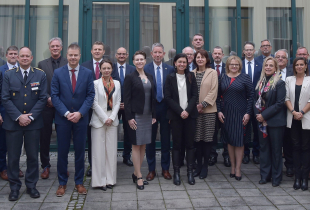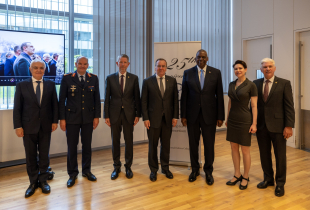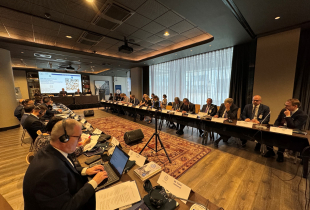Consortium Examines Croatia’s Journey with the EU
The Partnership for Peace Consortium recently concluded the Regional Stability in Southeast Europe Study Group’s 45th Workshop in Split, Croatia, Sep. 14-17. The workshop involved the participation of over 35 experts and academics from various backgrounds, including the Ministry of Defense, NATO, think tanks and foreign affairs.
In collaboration with the Austrian National Defence Academy, Directorate General for Defence Policy at the Austrian Ministry of Defence, PfP Consortium of Defense Academies and Security Studies Institutes, and the Institute for Development and International Relations, the RSSEE SG examined Croatia’s Accession to the Eurozone and Schengen area and the potential impact on countries in Southeast Europe.
The working group found that Croatia's successful completion of EU integration by joining the Euro and Schengen-zone demonstrates that western integration still holds great transformational power for the Southeast Europe region, even in geopolitically turbulent times. These Croatian experiences could be invaluable in harnessing the geopolitical momentum for accelerated EU Integration in the still-fragile Western Balkans region. Developing this conclusion, PfPC's RSSEE SG examined:
- Croatia's EU Integration Impact: The workshop analyzed the effects of Croatia's EU integration on the region, considering both advantages and challenges.
- Contemporary Challenges: They discussed present challenges facing the Schengen Area, the Eurozone and the European Union, with attention to areas needing improvement.
- Croatia's Regional Policies: An evaluation of Croatia's policies aimed at promoting political and economic consolidation in Southeast Europe, along with their potential to assist non-EU members in meeting EU membership criteria.
- Country-Specific Challenges: They focused on the unique challenges facing individual countries in the region, recognizing their distinct paths and experiences.
- International Actors' Role: The contributions of international entities, including the European Union, the OSCE, NATO, and others, in strengthening the region's transformational processes were assessed, with a focus on identifying areas for improvement.
- Opponents of Accession: Strategies for addressing the concerns of prominent opponents among countries in the region seeking accession to transatlantic structures were discussed through diplomatic means.
Ms. Andreja Metelko-Zgombic, State Secretary for Europe at the Ministry of Foreign and European Affairs of the Republic of Croatia, delivered the keynote address, discussing Croatia's journey toward European integration, marked by national consensus, which has resulted in its membership in NATO, the EU, Schengen and the Eurozone, alongside 15 other countries.
“There is no doubt that the European path is the right path [for Croatia],” she said.
With Croatia now one of 16 countries that are members of NATO, the EU, Schengen and the Eurozone, the workshop acknowledged the complexity of the European integration process. Insights from Croatia's experience to be published in the coming weeks by the RSSEE SG aim to inform policymakers and stakeholders on the nature of European integration and its potential impacts on the geopolitical landscape.


